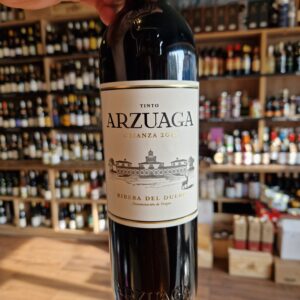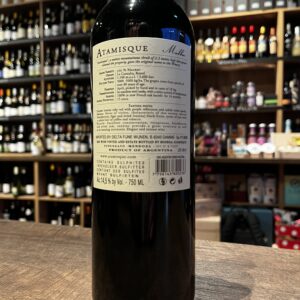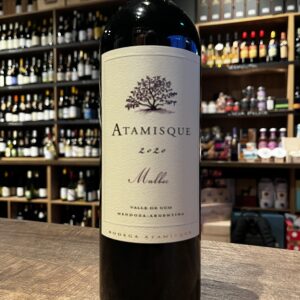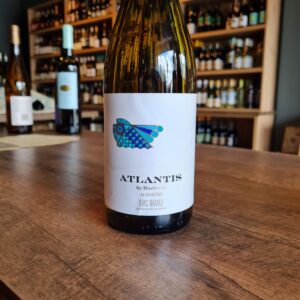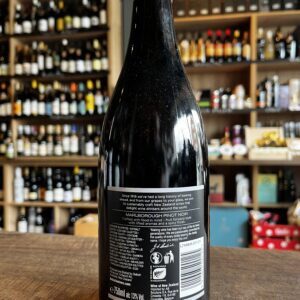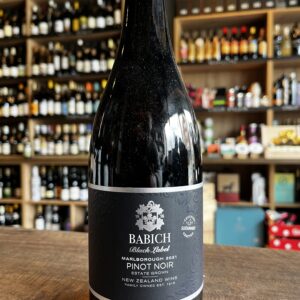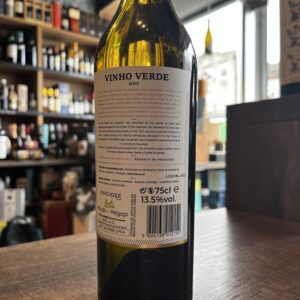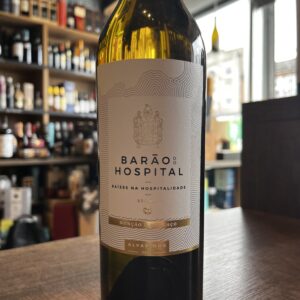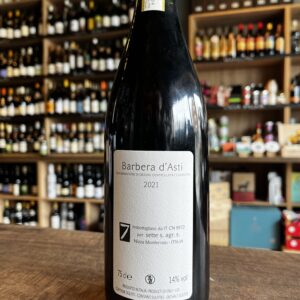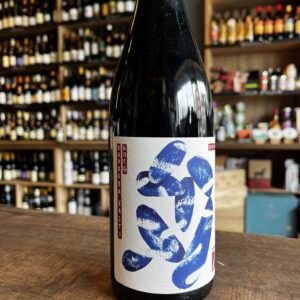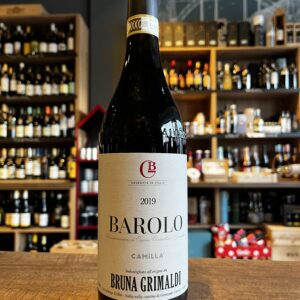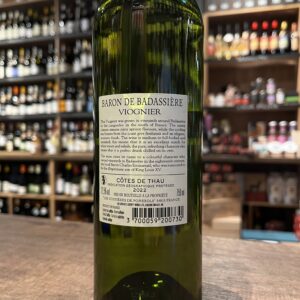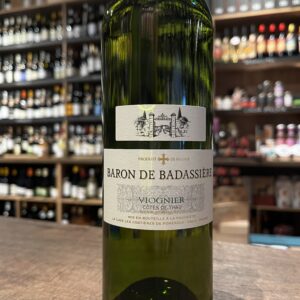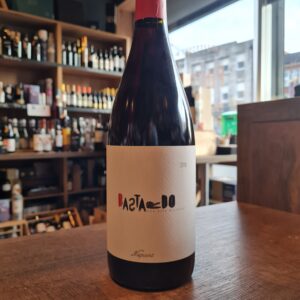-
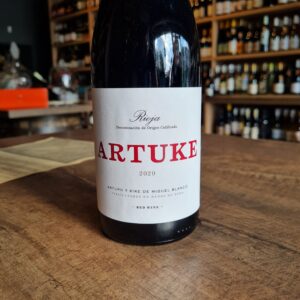 Made in a Beaujolais style, with the carbonic maceration method. This juicy ''Joven'' fresh fruited style of Rioja has zero oak influence as it ages in concrete tanks for 6 months. Farmed without any synthetic fertilizers or pesticides. Arturo Blanco was once asked what the philosophy at Bodegas Artuke was and he simply replied 'we are farmers'. The approach here is 100% focused on interpreting the family's 32 plots which are split between the villages of Baños de Ebro and Ábalos in Rioja Alavesa. Biodynamic techniques are employed in the vineyards and Arturo and Kike are also busy recovering old, ignored plots of ancient vines. Vinification is aimed at expressing the characteristics of the vineyard and quality of fruit above all else. The restrained use of oak and inclination towards different types/sizes of barrel, plus an unwillingness to adhere to the subscribed regimes for classification means that Artuke are precluded from using Crianza, Reserva and Gran Reserva designations on their wines. This mouth-watering red wine takes a relatively deep chill which makes it a versatile pairing with all types of food: tuna, pretty much anything made with zucchini, fried chicken, gooey cheese sandwiches, pizza, etc…
Made in a Beaujolais style, with the carbonic maceration method. This juicy ''Joven'' fresh fruited style of Rioja has zero oak influence as it ages in concrete tanks for 6 months. Farmed without any synthetic fertilizers or pesticides. Arturo Blanco was once asked what the philosophy at Bodegas Artuke was and he simply replied 'we are farmers'. The approach here is 100% focused on interpreting the family's 32 plots which are split between the villages of Baños de Ebro and Ábalos in Rioja Alavesa. Biodynamic techniques are employed in the vineyards and Arturo and Kike are also busy recovering old, ignored plots of ancient vines. Vinification is aimed at expressing the characteristics of the vineyard and quality of fruit above all else. The restrained use of oak and inclination towards different types/sizes of barrel, plus an unwillingness to adhere to the subscribed regimes for classification means that Artuke are precluded from using Crianza, Reserva and Gran Reserva designations on their wines. This mouth-watering red wine takes a relatively deep chill which makes it a versatile pairing with all types of food: tuna, pretty much anything made with zucchini, fried chicken, gooey cheese sandwiches, pizza, etc… -
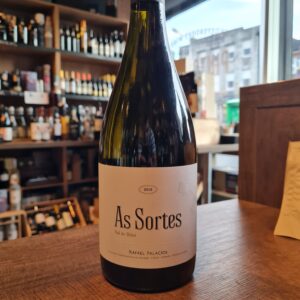 Rafael Palacios is the son of D. José Palacios Remondo (founder of Bodegas Palacios Remondo) and the brother of Alvaro Palacios(Priorat) but ultimately a passionate producer of white wine. After producing his first white at the family-run winery, called Plácet, he decided to set up his own winery in Galicia, in the Valle del Bibei, under the Valdeorras denomination. Established in 2004, Rafael Palacios has rapidly become one of Spain’s greatest producers of white wine. His focus is on the local variety Godello, grown in a small estate on very old vines that are up to 90 years old from the areas steep-sided, terraced vineyards and have been cultivated with respect of the land, without using any type of herbicide or pesticide. Rafael Palacios is refining his work year after year, reaching the magic of the greatest wines. A top wine, and one to keep. Grub pairing suggestions are mild Asian dishes, Moroccan specialities, fish ragout with saffron sauce Risotto ai frutti di mar
Rafael Palacios is the son of D. José Palacios Remondo (founder of Bodegas Palacios Remondo) and the brother of Alvaro Palacios(Priorat) but ultimately a passionate producer of white wine. After producing his first white at the family-run winery, called Plácet, he decided to set up his own winery in Galicia, in the Valle del Bibei, under the Valdeorras denomination. Established in 2004, Rafael Palacios has rapidly become one of Spain’s greatest producers of white wine. His focus is on the local variety Godello, grown in a small estate on very old vines that are up to 90 years old from the areas steep-sided, terraced vineyards and have been cultivated with respect of the land, without using any type of herbicide or pesticide. Rafael Palacios is refining his work year after year, reaching the magic of the greatest wines. A top wine, and one to keep. Grub pairing suggestions are mild Asian dishes, Moroccan specialities, fish ragout with saffron sauce Risotto ai frutti di mar -
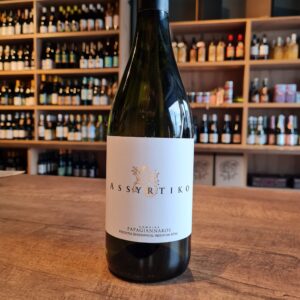 Founded in 1919, Domaine Papagiannakos is located in the Attica region of Central Greece, just 18 miles from Athens. Today, the winery is run by the 3rd generation, Vassilis Papagiannakos, who has issued a new era of modern winemaking while still maintaining the family’s dedication to cultivating and preserving the region’s most famous indigenous grape, Savatiano. In addition the Domaine has plant Malagousia and Assyrtiko. The Assyrtiko vineyards are located in northeastern Attica at an altitude of 330 feet. The vineyard has a northeastern facing exposure. The vineyard is farmed without irrigation, resulting in low-yielding vines that produce grapes with rich, concentrated fruit flavors. The limestone soil and the unique microclimate of the region produces wine with a very clean and crisp profile with citrus and white flesh aromas.The acidity is very well integrated into the wine and gives the ability for long aging. With aging the wine develops a beautiful mineral character. The refreshing character of the wine makes it an ideal accompaniment for seafood, fish, white meat, and Mediterranean cuisine.
Founded in 1919, Domaine Papagiannakos is located in the Attica region of Central Greece, just 18 miles from Athens. Today, the winery is run by the 3rd generation, Vassilis Papagiannakos, who has issued a new era of modern winemaking while still maintaining the family’s dedication to cultivating and preserving the region’s most famous indigenous grape, Savatiano. In addition the Domaine has plant Malagousia and Assyrtiko. The Assyrtiko vineyards are located in northeastern Attica at an altitude of 330 feet. The vineyard has a northeastern facing exposure. The vineyard is farmed without irrigation, resulting in low-yielding vines that produce grapes with rich, concentrated fruit flavors. The limestone soil and the unique microclimate of the region produces wine with a very clean and crisp profile with citrus and white flesh aromas.The acidity is very well integrated into the wine and gives the ability for long aging. With aging the wine develops a beautiful mineral character. The refreshing character of the wine makes it an ideal accompaniment for seafood, fish, white meat, and Mediterranean cuisine. -
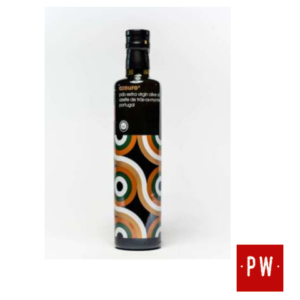 A premium quality oil created from a unique blend of the finest indigenous olive varieties – Verdeal, Madural & Cobrançosa.It has a balanced & harmonious flavour, with a fresh green fruity aroma and a precious golden green colour. There is a sweetness to the taste with notes of almonds, a medium peppery bite & an elegant lasting finish.
A premium quality oil created from a unique blend of the finest indigenous olive varieties – Verdeal, Madural & Cobrançosa.It has a balanced & harmonious flavour, with a fresh green fruity aroma and a precious golden green colour. There is a sweetness to the taste with notes of almonds, a medium peppery bite & an elegant lasting finish. -
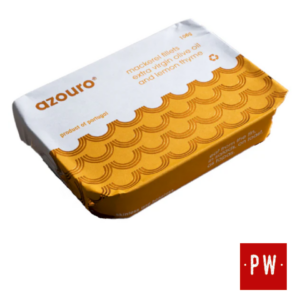 Azouro Mackerel fillets in organic extra virgin olive oil and lemon thyme. 100% pure and premium quality mackerel fillets in organic extra virgin olive oil and lemon thyme. Skinless and boneless. Ready to eat.Eat from the tin, in salads, on toast, as tapas. The freshest fish with the purest olive oil and a hint of lemon thyme (herb) combine to make an incredible taste and flavour sensation.A more interesting way to enjoy tinned fish!Rich in Omega-3 and an excellent source of protein.Canned and packaged by hand in Matosinhos (fishing port), Northern Portugal, combining traditional Portuguese methods with modern technologies and the highest quality standards.
Azouro Mackerel fillets in organic extra virgin olive oil and lemon thyme. 100% pure and premium quality mackerel fillets in organic extra virgin olive oil and lemon thyme. Skinless and boneless. Ready to eat.Eat from the tin, in salads, on toast, as tapas. The freshest fish with the purest olive oil and a hint of lemon thyme (herb) combine to make an incredible taste and flavour sensation.A more interesting way to enjoy tinned fish!Rich in Omega-3 and an excellent source of protein.Canned and packaged by hand in Matosinhos (fishing port), Northern Portugal, combining traditional Portuguese methods with modern technologies and the highest quality standards. -
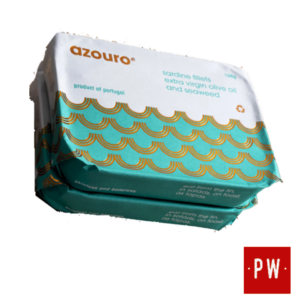 Award-winning sardines in extra virgin olive oil,on a bed of organic seaweed (Sea Lettuce & Bladderwrack). Combine to make an incredibly delicate taste, and umami flavour sensation. Our fish are rich in Omega-3 and an excellent source of protein. Prepared, canned, and packaged by hand in Matosinhos (fishing port), Northern Portugal, combining traditional Portuguese methods with modern technologies and the highest quality standards. Our fish is skinless, boneless, and ready to eat from the tin, in salads, on toast, or as tapas.
Award-winning sardines in extra virgin olive oil,on a bed of organic seaweed (Sea Lettuce & Bladderwrack). Combine to make an incredibly delicate taste, and umami flavour sensation. Our fish are rich in Omega-3 and an excellent source of protein. Prepared, canned, and packaged by hand in Matosinhos (fishing port), Northern Portugal, combining traditional Portuguese methods with modern technologies and the highest quality standards. Our fish is skinless, boneless, and ready to eat from the tin, in salads, on toast, or as tapas. -
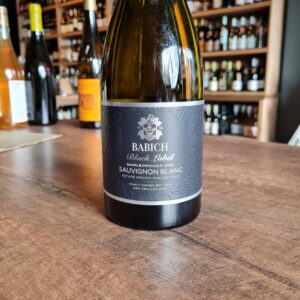 The Babich family hails from Croatia and first bought land in New Zealand in 1916. The winery is now in its third generation. Fruit for this wine comes from a variety of its estate-owned vineyards which are sustainable or organic. Most of the juice for this wine is fermented in stainless steel with a small percentage in old oak. Crafted with food in mind-weighty, ripe, tropical fruit, flavoured style, rich and rounded. Pair it with veal, seafood (oysters) or a chicken dish.
The Babich family hails from Croatia and first bought land in New Zealand in 1916. The winery is now in its third generation. Fruit for this wine comes from a variety of its estate-owned vineyards which are sustainable or organic. Most of the juice for this wine is fermented in stainless steel with a small percentage in old oak. Crafted with food in mind-weighty, ripe, tropical fruit, flavoured style, rich and rounded. Pair it with veal, seafood (oysters) or a chicken dish. -
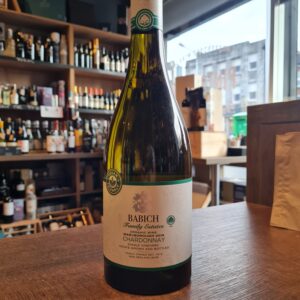 Family Estates Organic Marlborough Chardonnay; a complex style of Chardonnay grown in our Headwaters vineyard in Marlborough. The cooler climate and alluvial soils of Marlborough deliver flavour and varietal complexity that is reflective of the region and our winemaker’s commitment to sustainably crafting the most drinkable New Zealand wines in the world. This organic Chardonnay wine would go well with poultry or fish or vegetable medley.
Family Estates Organic Marlborough Chardonnay; a complex style of Chardonnay grown in our Headwaters vineyard in Marlborough. The cooler climate and alluvial soils of Marlborough deliver flavour and varietal complexity that is reflective of the region and our winemaker’s commitment to sustainably crafting the most drinkable New Zealand wines in the world. This organic Chardonnay wine would go well with poultry or fish or vegetable medley. -
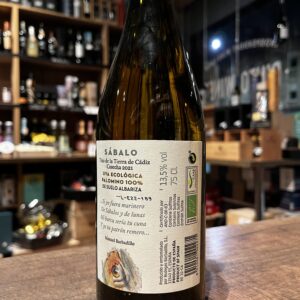
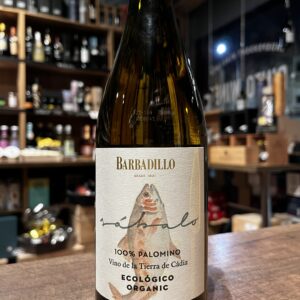 Sábalo is produced from 100% ecological Palomino Fino grapes and it is a spectacular wine, the true fruit of our many years of expertise. The grapes used to produce this wine are harvested in the white albariza soils of Sanlúcar, and as such the sea, the marshlands and the Guadalquivir River all form part of what is essentially Sábalo’s DNA.
Sábalo is produced from 100% ecological Palomino Fino grapes and it is a spectacular wine, the true fruit of our many years of expertise. The grapes used to produce this wine are harvested in the white albariza soils of Sanlúcar, and as such the sea, the marshlands and the Guadalquivir River all form part of what is essentially Sábalo’s DNA. -
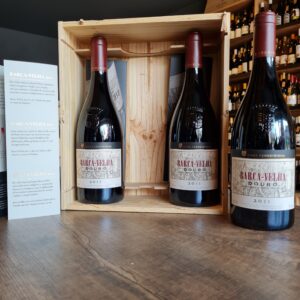 Casa Ferreirinha, was acquired by Sogrape Vinhos in 1987, its wines are synonymous with time and art. This has happened since its foundation, in the 18th century, by the hand of Bernardo Ferreira, who saw the formula refined by his descendants, especially by his granddaughter Dona Antónia Adelaide Ferreira, who affectionately became known as "Ferreirinha" or "Ferreirinha-da-Régua" for the people of that land. Through the hands of Dona Antónia, who twice widowed herself at the head of a large company, Ferreira consolidated itself admirably. Her entrepreneurial spirit taught her to foresee, decide, create, teach and love, making her a figure of great projection and charisma. Barca Velha is the result of the passion of Fernando Nicolau de Almeida (Casa Ferreirinha Head Winemaker in 1952), who envisioned a high quality Douro Red Wines made with the aging potential of Vintage Ports. The first harvest was 1952. Barca Velha is only released in exceptional years, current head winemaker Luis Sottomayor began his career at this house as an apprentice learning directly from Fernando Nicolau D'Almeida. ''2011 was an extraordinary year-one of the best ever in Douro-Intense and exceptional quality. When this wine was born, we soon realized that it would be destined for Barca-Velha”. But even so, it was necessary to pass the great test of time with distinction. In the barrels, first, and then in the bottle, it was followed and evaluated over nine years, until the final decision was made.
Casa Ferreirinha, was acquired by Sogrape Vinhos in 1987, its wines are synonymous with time and art. This has happened since its foundation, in the 18th century, by the hand of Bernardo Ferreira, who saw the formula refined by his descendants, especially by his granddaughter Dona Antónia Adelaide Ferreira, who affectionately became known as "Ferreirinha" or "Ferreirinha-da-Régua" for the people of that land. Through the hands of Dona Antónia, who twice widowed herself at the head of a large company, Ferreira consolidated itself admirably. Her entrepreneurial spirit taught her to foresee, decide, create, teach and love, making her a figure of great projection and charisma. Barca Velha is the result of the passion of Fernando Nicolau de Almeida (Casa Ferreirinha Head Winemaker in 1952), who envisioned a high quality Douro Red Wines made with the aging potential of Vintage Ports. The first harvest was 1952. Barca Velha is only released in exceptional years, current head winemaker Luis Sottomayor began his career at this house as an apprentice learning directly from Fernando Nicolau D'Almeida. ''2011 was an extraordinary year-one of the best ever in Douro-Intense and exceptional quality. When this wine was born, we soon realized that it would be destined for Barca-Velha”. But even so, it was necessary to pass the great test of time with distinction. In the barrels, first, and then in the bottle, it was followed and evaluated over nine years, until the final decision was made. -
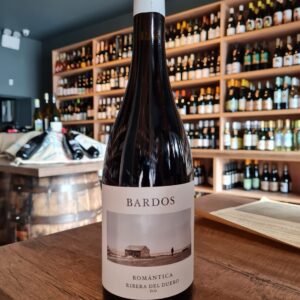 Bardos Romantica is a red wine from Ribera del Duero, produced by Bodegas Bardos, belonging to the Vintae Group, which are known to produce wines in twelve different Spanish regions, such as the Hacienda López from Haro. Made from 100% Tinta del País (Tempranillo). The grapes come from a rigorous selection of low yielding old vines located in the highlands of the central plateau in Onesimus Quintanilla (Valladolid). The grapes, once collected, are transported to the winery in boxes of 15 kilos and small trailers. Here a selection of bunches is made on tables. Subsequent fermentation and maceration is carried out in vats at a temperature of 28ªC for 3 or 4 weeks. Once fermented and macerated, Bardos Romantica undergoes a malolactic fermentation in French oak barrels, with a weekly beating and strict control of each barrel. Finally, Bardos Romantica is aged for 14 months in barrels of one and two years in French oak, located in underground cellars where the temperature is maintained throughout the year at around 14ºC. Bardos Romantica is a soft and original wine. After all the technicalities all I can say is a great wine, enjoy it, share it!
Bardos Romantica is a red wine from Ribera del Duero, produced by Bodegas Bardos, belonging to the Vintae Group, which are known to produce wines in twelve different Spanish regions, such as the Hacienda López from Haro. Made from 100% Tinta del País (Tempranillo). The grapes come from a rigorous selection of low yielding old vines located in the highlands of the central plateau in Onesimus Quintanilla (Valladolid). The grapes, once collected, are transported to the winery in boxes of 15 kilos and small trailers. Here a selection of bunches is made on tables. Subsequent fermentation and maceration is carried out in vats at a temperature of 28ªC for 3 or 4 weeks. Once fermented and macerated, Bardos Romantica undergoes a malolactic fermentation in French oak barrels, with a weekly beating and strict control of each barrel. Finally, Bardos Romantica is aged for 14 months in barrels of one and two years in French oak, located in underground cellars where the temperature is maintained throughout the year at around 14ºC. Bardos Romantica is a soft and original wine. After all the technicalities all I can say is a great wine, enjoy it, share it! -
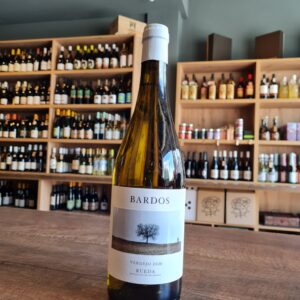 Bardos Verdejo is a wine made from 100% Verdejo from vineyards that are 20-25 years old, located in Rueda, at more than 700 metres of altitude on stony soils. The harvest is carried out at night, at temperatures below 15ºC. The fermentation is done with local yeasts at a controlled temperature and the wine rests on its lees for at least 4 months, gaining complexity and texture. On the nose, the intense aromas of fruit such as white peach combine with cut grass, citrus, balsamic and mineral notes. In the mouth it has a good volume and persistence, well integrated acidity and a characteristic aniseed aftertaste, typical of the grape. Really a high quality example of this native Spanish variety. Excellent with light bites, starters, salads and white fish. All of the wines by De Bardos are crafted by hand in a fully artisan manner.
Bardos Verdejo is a wine made from 100% Verdejo from vineyards that are 20-25 years old, located in Rueda, at more than 700 metres of altitude on stony soils. The harvest is carried out at night, at temperatures below 15ºC. The fermentation is done with local yeasts at a controlled temperature and the wine rests on its lees for at least 4 months, gaining complexity and texture. On the nose, the intense aromas of fruit such as white peach combine with cut grass, citrus, balsamic and mineral notes. In the mouth it has a good volume and persistence, well integrated acidity and a characteristic aniseed aftertaste, typical of the grape. Really a high quality example of this native Spanish variety. Excellent with light bites, starters, salads and white fish. All of the wines by De Bardos are crafted by hand in a fully artisan manner. -
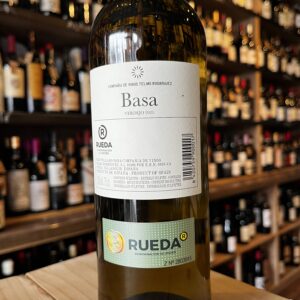
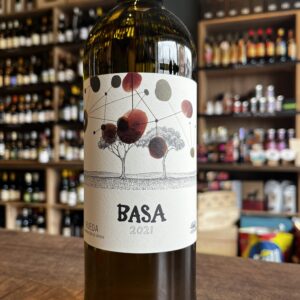 Telmo Rodriguez of Basque origin, studied wine at the Institute of Oenology in Bordeaux, before doing internships with Cos d’Estournel, Jean Louis Chave and Trevallon . He also worked in the vinification of wines from the family estate of Remelluri, in Rioja. Then, in 1990, with an investment of just a few thousand euros, he launched his own winery. He buys grapes to produce his first wines. His first plots of property did not arrive until 1997, in Rioja. Paradoxical for someone who was dying to explore new regions. One of the main principles of Telmo Rodriguez is that of respecting the Spanish tradition of cultivating the vine in goblet, because this method of managing the vine protects it from the great heat of Iberian vineyards. He is fiercely opposed to the fashion of trellising vineyards and only buys vines that respect his ideal. Telmo also works in biodynamics but, showing great common sense, he admits that he only does it for the respect of the land and that the mention of organic viticulture has no importance in his eyes. The important thing is that the result is a balanced and tasty wine. The name comes from the 40-year-old 'baso' or bush-trained vines that are planted on limestone-rich soils at over 700-meters elevation on a plateau along the Duero River. Soils are made of gravel from fluvial terraces, erosion slopes and glacis. Pairs great with comfort food, Tapas and Tortillas of all sorts
Telmo Rodriguez of Basque origin, studied wine at the Institute of Oenology in Bordeaux, before doing internships with Cos d’Estournel, Jean Louis Chave and Trevallon . He also worked in the vinification of wines from the family estate of Remelluri, in Rioja. Then, in 1990, with an investment of just a few thousand euros, he launched his own winery. He buys grapes to produce his first wines. His first plots of property did not arrive until 1997, in Rioja. Paradoxical for someone who was dying to explore new regions. One of the main principles of Telmo Rodriguez is that of respecting the Spanish tradition of cultivating the vine in goblet, because this method of managing the vine protects it from the great heat of Iberian vineyards. He is fiercely opposed to the fashion of trellising vineyards and only buys vines that respect his ideal. Telmo also works in biodynamics but, showing great common sense, he admits that he only does it for the respect of the land and that the mention of organic viticulture has no importance in his eyes. The important thing is that the result is a balanced and tasty wine. The name comes from the 40-year-old 'baso' or bush-trained vines that are planted on limestone-rich soils at over 700-meters elevation on a plateau along the Duero River. Soils are made of gravel from fluvial terraces, erosion slopes and glacis. Pairs great with comfort food, Tapas and Tortillas of all sorts -
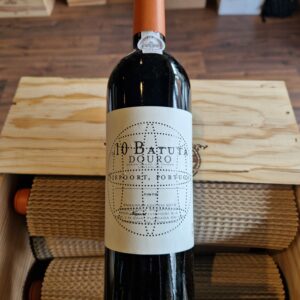 Niepoort is a family business dating back to 1842. Its winemaking tradition began in the Douro region, with the roduction of Port wine. Nowadays has a foothold in all the major Portuguese regions with still wines production outside the Douro Valley. Know-how, enthusiasm and an innovative mindset have passed down from generation to generation, making Niepoort one of the most authentic and notable Portuguese wine producers. The grapes to produce this wine come from Quinta do Carril, from a north-facing vineyard with more than 70 years, and also from old vineyards about 100 years old near Quinta de Nápoles. Niepoort sums up this elegant bottling well by saying “Batuta is a wine of extremes, having more of everything, is at the same time, the one with a more discrete behavior.” Quite so this year (and most), as the wine opens with subtlety and elegance, seeming rather mute. It is somewhat tinged by oak early in its life. That will be easily absorbed. It takes some air and patience to see what this sometimes too subtle wine has, but there is good structure underneath (and a little tannic pop that emerges with air) that should allow the wine to develop well and have the time to acquire some complexity, which is often its best feature. It has a very Burgundian feel, with a silky, graceful mid-palate. There is nothing obvious about this bottling in any year. This year, certainly, it is a Batuta that is perhaps subtle to a fault, but it will be a perfect food wine and when you are drinking it you will suddenly realize how much you like it.'' Time will tell, definitely one of the great current masters of winemaking. Not just in Portugal but in the world
Niepoort is a family business dating back to 1842. Its winemaking tradition began in the Douro region, with the roduction of Port wine. Nowadays has a foothold in all the major Portuguese regions with still wines production outside the Douro Valley. Know-how, enthusiasm and an innovative mindset have passed down from generation to generation, making Niepoort one of the most authentic and notable Portuguese wine producers. The grapes to produce this wine come from Quinta do Carril, from a north-facing vineyard with more than 70 years, and also from old vineyards about 100 years old near Quinta de Nápoles. Niepoort sums up this elegant bottling well by saying “Batuta is a wine of extremes, having more of everything, is at the same time, the one with a more discrete behavior.” Quite so this year (and most), as the wine opens with subtlety and elegance, seeming rather mute. It is somewhat tinged by oak early in its life. That will be easily absorbed. It takes some air and patience to see what this sometimes too subtle wine has, but there is good structure underneath (and a little tannic pop that emerges with air) that should allow the wine to develop well and have the time to acquire some complexity, which is often its best feature. It has a very Burgundian feel, with a silky, graceful mid-palate. There is nothing obvious about this bottling in any year. This year, certainly, it is a Batuta that is perhaps subtle to a fault, but it will be a perfect food wine and when you are drinking it you will suddenly realize how much you like it.'' Time will tell, definitely one of the great current masters of winemaking. Not just in Portugal but in the world -
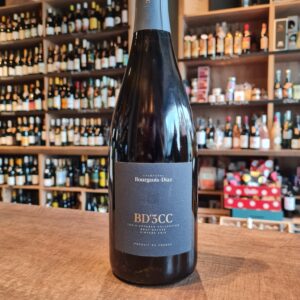 Located in Crouttes-sur-Marne, about 25km east of Meaux, the Bourgeois Diaz vineyard comprises 6.80 hectares of vines, of which 3.5 hectares are planted with Pinot Meunier, 2 with Pinot Noir and 1.3 with Chardonnay. The vines are on average 40 years old and have their roots in soils of clay, silt and chalk . Jérôme is the fourth generation of winegrowers on his father's side. His wife Charlotte, joined the estate in 2016, and today plays an important role in overseeing the estate, helping to develop the quality of the Champagnes. No pesticides, no chemical fertilizers, no technological manipulation, the wines of Jérôme and Charlotte are not only cared for, they are loved. The estate has been certified in organic and biodynamic viticulture since 2014. The biodynamic preparations 5 00P (twice a year) and 501 (3 to 4 times a year) are combined with low doses of copper and sulfur, horsetail decoctions, nettle, wicker, meadowsweet, chamomile, yarrow herbal teas, etc. Green manures are sown every other row, and an agro-forestry project was launched in 2019 (planting of 50 trees in a plot of 45 ares). Most of the work is done manually, foot by foot, to bring the maximum attention to the vines, which explains why the estate employs almost one person per hectare year-round. The harvest is manual, and most of the pickers are regulars, knowing the terroir and the state of mind of the estate. The bunches are harvested when ripe and sorted, so as to bring in grapes only in perfect sanitary condition. Disgorged on 01/12/2019 after 5 years of ageing, this non-dosed brut nature Champagne is straight, ample and deep, with great complexity brought by the long aging in the bottle Pair it with Lobster, bar carpaccio, lean tartare, Saint-Pierre, sweetbreads. Salut!!
Located in Crouttes-sur-Marne, about 25km east of Meaux, the Bourgeois Diaz vineyard comprises 6.80 hectares of vines, of which 3.5 hectares are planted with Pinot Meunier, 2 with Pinot Noir and 1.3 with Chardonnay. The vines are on average 40 years old and have their roots in soils of clay, silt and chalk . Jérôme is the fourth generation of winegrowers on his father's side. His wife Charlotte, joined the estate in 2016, and today plays an important role in overseeing the estate, helping to develop the quality of the Champagnes. No pesticides, no chemical fertilizers, no technological manipulation, the wines of Jérôme and Charlotte are not only cared for, they are loved. The estate has been certified in organic and biodynamic viticulture since 2014. The biodynamic preparations 5 00P (twice a year) and 501 (3 to 4 times a year) are combined with low doses of copper and sulfur, horsetail decoctions, nettle, wicker, meadowsweet, chamomile, yarrow herbal teas, etc. Green manures are sown every other row, and an agro-forestry project was launched in 2019 (planting of 50 trees in a plot of 45 ares). Most of the work is done manually, foot by foot, to bring the maximum attention to the vines, which explains why the estate employs almost one person per hectare year-round. The harvest is manual, and most of the pickers are regulars, knowing the terroir and the state of mind of the estate. The bunches are harvested when ripe and sorted, so as to bring in grapes only in perfect sanitary condition. Disgorged on 01/12/2019 after 5 years of ageing, this non-dosed brut nature Champagne is straight, ample and deep, with great complexity brought by the long aging in the bottle Pair it with Lobster, bar carpaccio, lean tartare, Saint-Pierre, sweetbreads. Salut!!


